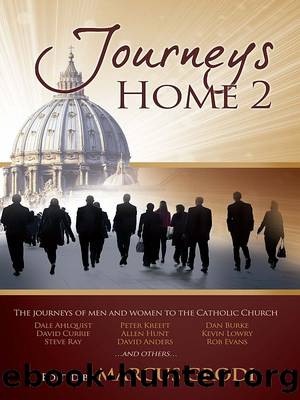Journeys Home 2 by Marcus C. Grodi

Author:Marcus C. Grodi
Language: eng
Format: mobi
Tags: 1. Catholics--Biography. 2. Coming Home Network International. I. Grodi, Marcus. II. Title: Journeys Home Two.
Publisher: Coming Home Network International, Zanesville OH
Published: 2015-02-14T16:00:00+00:00
BORN FUNDAMENTALIST, BORN AGAIN CATHOLIC
VIEWS ON THE CATHOLIC FAITH
BAPTISM
SEMINARY
SUFFERING
THE "END TIMES"
CRISIS AND RECONCILIATION
DAVID CURRIE
former Fundamentalist missionary
The day President John F. Kennedy was shot is one of my most vivid childhood memories. I was in sixth grade playing on the playground when the rumors started. Just before the dismissal bell at the end of the day, the principal made the announcement over the PA system: JFK had been assassinated.
School was dismissed in eerie silence. Tears welled up in my eyes as I walked the half mile home that afternoon. My sorrow was almost overwhelming for a sixth-grader, not only because our President was dead, but primarily because in my heart of hearts I believed that he was in hell.
He was a Catholic, and I was a Christian Fundamentalist.
I was the second child in a family of four children, the only boy. Since my father was a Fundamentalist preacher, I was what people often called a "PK" (preacher's kid). My parents had met at Houghton College after my mother transferred there from Nyack Bible Institute in New York. They returned to Chicago and were married by A. W. Tozer, a well-known Fundamentalist author who was also their pastor. I was born while my father was attending Dallas Theological Seminary. At various times, both of my parents taught at Moody Bible Institute.
I have fond memories of sitting in church every Sunday listening to my father preach. Through him, I had an education in theology before I ever attended seminary. Every Sunday, we attended church for Sunday school, morning worship, evening worship, and youth group. We also faithfully attended Wednesday prayer meeting and Friday youth group each week. Our entire lives revolved around our church.
The only annual religious celebrations our church observed were Christmas and Easter. Other than those two holidays, I had never even heard of a "church calendar" that recognized the events of the Incarnation every year. We did celebrate certain secular holidays, however, such as Mother's Day.
We were called "Fundamentalists" because we believed in the "fundamentals" of the Christian faith. Fundamentalism as a theological movement had been formulated in reaction to the rise of modernism in Protestant theology around the beginning of the twentieth century. We felt that it was important that we be clear on the inspiration and inerrancy of the Bible, as well as the truths of Christ's divinity, virgin birth, substitutionary atonement, bodily resurrection, and imminent second coming to set up His earthly kingdom. (The last of these beliefs is known as "premillennialism.")
Although we believed that Fundamentalist Christianity predated the Reformation, we still accepted the twin pillars of the Reformation: sola scriptura (Scripture alone) and sola fide (faith alone).
A person became a Christian, we insisted, by believing that Christ died to pay the penalty of sin, admitting that all his own efforts at heaven were useless, and accepting Christ as his personal Savior. A single prayer was the only prerequisite for a "personal relationship" with God.
On a practical level, being Fundamentalist meant keeping oneself separate from the evils of the world.
Download
This site does not store any files on its server. We only index and link to content provided by other sites. Please contact the content providers to delete copyright contents if any and email us, we'll remove relevant links or contents immediately.
Resisting Happiness by Matthew Kelly(3341)
The Social Psychology of Inequality by Unknown(3031)
Day by Elie Wiesel(2783)
Designing Your Life by Bill Burnett(2747)
The Giving Tree by Shel Silverstein(2344)
Human Design by Chetan Parkyn(2073)
The Supreme Gift by Paulo Coelho(1978)
Angels of God: The Bible, the Church and the Heavenly Hosts by Mike Aquilina(1969)
Jesus of Nazareth by Joseph Ratzinger(1811)
Hostage to the Devil by Malachi Martin(1803)
Augustine: Conversions to Confessions by Robin Lane Fox(1772)
7 Secrets of Divine Mercy by Vinny Flynn(1746)
Dark Mysteries of the Vatican by H. Paul Jeffers(1723)
The Vatican Pimpernel by Brian Fleming(1703)
St. Thomas Aquinas by G. K. Chesterton(1634)
Saints & Angels by Doreen Virtue(1605)
The Ratline by Philippe Sands(1580)
My Daily Catholic Bible, NABRE by Thigpen Edited by Dr. Paul(1503)
Called to Life by Jacques Philippe(1481)
